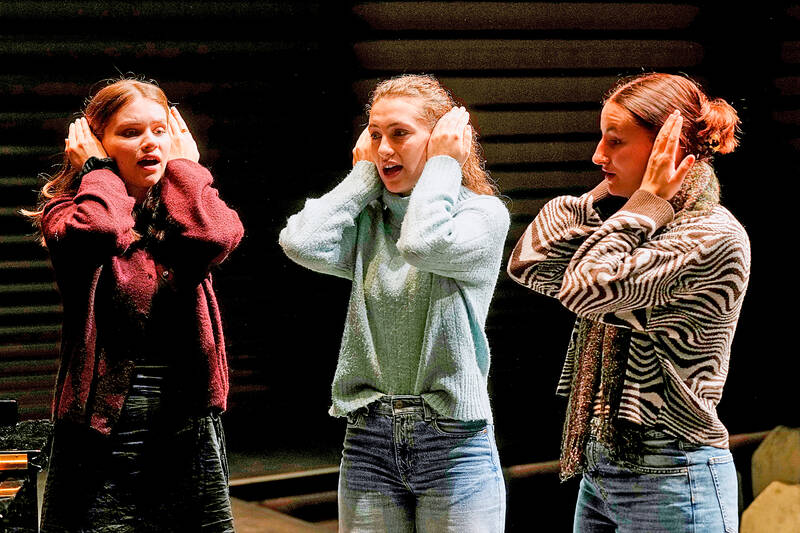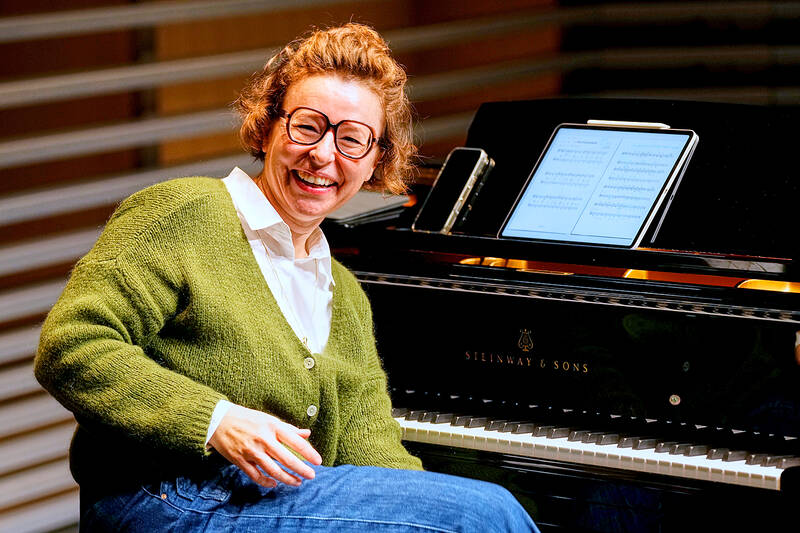Yodel-ay-hee ... what?! Those famed yodeling calls that for centuries have echoed through the Alps, and more recently have morphed into popular song and folk music, could soon reap a response — from faraway Paris.
Switzerland’s government is looking for a shout-out from UN cultural agency UNESCO, based in the French capital, to include the tradition of yodeling on its list of intangible cultural heritage. A decision is expected by year-end.
Modern-day promoters emphasize that the yodel is far more than the mountain cries of yesteryear by falsetto-bellowing male herders in suspenders who intone alongside giant Alphorns atop verdant hillsides. It’s now a popular form of singing.

Photo: AP
Over the last century, yodeling clubs sprouted up in Switzerland, building upon the tradition and broadening its appeal — with its tones, techniques and tremolos finding their way deeper into the musical lexicon internationally in classical, jazz and folk. US country crooners prominently blended yodels into their songs in the late 1920s and 30s.
About seven years ago, the Lucerne University of Applied Sciences and Arts, or HSLU by its German-language acronym, became the first Swiss university to teach yodeling.
“For me, actually, in Switzerland we have four languages but I think really we have five languages. We have a fifth: The yodel,” said HSLU professor Nadja Rass, alluding to the official German, French, Italian and Romansh languages in Switzerland. Yodeling exists in neighboring Austria, Germany and Italy, but Swiss yodeling is distinctive because of its vocal technique, she said.

Photo: AP
In its early days, yodeling involved chants of wordless vowel sounds, or “natural yodeling,” with melodies but no lyrics. More recently, “yodeling song” has included verses and a refrain.
The Swiss government says at least 12,000 yodelers take part through about 780 groups of the Swiss Yodeling Association.
In Switzerland, Rass said, yodeling is built on the “sound colors of the voice” and features two types: one centering on the head — with a “u” sound — and one emanating from deeper down in the chest — with an “o” sound.

Photo: AP
And even within Switzerland, styles vary: Yodeling in the northern region near Appenzell is more “melancholic, slower,” while in the country’s central regions, the sounds are “more intense and shorter,” she said.
What began as mostly a male activity is now drawing more and more women in a country that only finalized the right to vote for all women in the 1980s — long after most of its European neighbors.
Julien Vuilleumier, a scientific adviser for the Federal Office of Culture who is spearheading the Swiss request, said it’s tough to trace the origins of yodeling, which factors into the imagery of the Swiss Alps.
“Some say it’s a means of communication between valleys, using these very distinctive sounds that can carry a long way. Others believe it’s a form of singing,” he said. “What we know is that ... yodeling has always been transformed and updated.”
UNESCO’s government-level committee for Intangible Heritage in New Delhi will decide in mid-December. The classification aims to raise public awareness of arts, craftsmanship, rituals, knowledge and traditions that are passed down over generations.
Also among the 68 total nominations this year are traditions like Thanakha face powder in Myanmar; Ghanaian highlife music; the fermented Kyrgyz beverage Maksym; and the El Joropo music and dance tradition in Venezuela.
The list is different from the UNESCO World Heritage List, which enshrines protections for physical sites that are considered important to humanity, like the Pyramids of Giza in Egypt.
Last year, Japan’s famed sake — the smooth rice wine — was one of more than 60 honorees in the intangible heritage list, alongside things like the Nowruz spring festival in parts of central Asia, and the skills and knowledge of zinc roofers in Paris.
Rass of the Lucerne university says that candidates for the intangible heritage list are asked to specify the future prospects of cultural traditions.
“We figured out some projects to bring it to the future. And one of those is that we bring the yodel to the primary school,” said Rass, who herself grew up yodeling. She said 20 Swiss school teachers know how to yodel and are trying it with their classes.
“One of my life goals is that when I will die, in Switzerland every school child will be in contact with yodeling during their primary school time,” she said. “I think it’s a very good chance for the future of the yodel to be on that (UNESCO) list.”

Jacques Poissant’s suffering stopped the day he asked his daughter if it would be “cowardly to ask to be helped to die.” The retired Canadian insurance adviser was 93, and “was wasting away” after a long battle with prostate cancer. “He no longer had any zest for life,” Josee Poissant said. Last year her mother made the same choice at 96 when she realized she would not be getting out of hospital. She died surrounded by her children and their partners listening to the music she loved. “She was at peace. She sang until she went to sleep.” Josee Poissant remembers it as a beautiful

March 2 to March 8 Gunfire rang out along the shore of the frontline island of Lieyu (烈嶼) on a foggy afternoon on March 7, 1987. By the time it was over, about 20 unarmed Vietnamese refugees — men, women, elderly and children — were dead. They were hastily buried, followed by decades of silence. Months later, opposition politicians and journalists tried to uncover what had happened, but conflicting accounts only deepened the confusion. One version suggested that government troops had mistakenly killed their own operatives attempting to return home from Vietnam. The military maintained that the

Before the last section of the round-the-island railway was electrified, one old blue train still chugged back and forth between Pingtung County’s Fangliao (枋寮) and Taitung (台東) stations once a day. It was so slow, was so hot (it had no air conditioning) and covered such a short distance, that the low fare still failed to attract many riders. This relic of the past was finally retired when the South Link Line was fully electrified on Dec. 23, 2020. A wave of nostalgia surrounded the termination of the Ordinary Train service, as these train carriages had been in use for decades

Lori Sepich smoked for years and sometimes skipped taking her blood pressure medicine. But she never thought she’d have a heart attack. The possibility “just wasn’t registering with me,” said the 64-year-old from Memphis, Tennessee, who suffered two of them 13 years apart. She’s far from alone. More than 60 million women in the US live with cardiovascular disease, which includes heart disease as well as stroke, heart failure and atrial fibrillation. And despite the myth that heart attacks mostly strike men, women are vulnerable too. Overall in the US, 1 in 5 women dies of cardiovascular disease each year, 37,000 of them